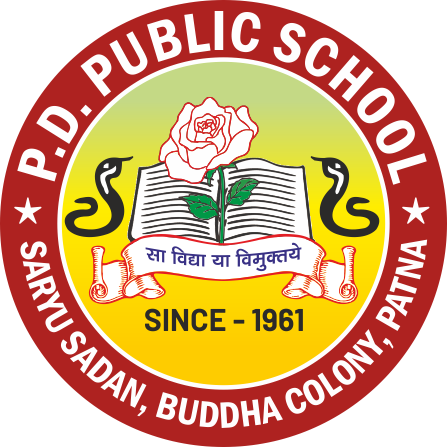About Us
About Us
The PD Public School is located in a serene residential area at Saryu-Sadan, Buddha Colony, Patna-1. The School is a Co-educational institution pursuing academic
brilliance and all-round excellence. The school stands for fortitude and discipline, honing the
skills involved in academics, sports and co-curricular activities. Our aim is to build citizens, India
will be proud of.
What is unique about our school?
We strongly believe.........
P.D. Public school is Unique.
“A student never fails it's the teachers who fail.”
P.D. Public school provides an invigorating educational environment that develops responsible citizens who can artfully navigate our complex world and enjoy a good life with others.
Each student engages in diverse investigations, disciplined inquiry, and integrated service-learning to cultivate intercultural awareness, creativity and mental acuity.
Teachers in P.D. Public school incorporate instructional models like the 5Es Model into their classrooms which helps students build a strong foundation of knowledge through active participation.
The 5E Model is based on the constructivist theory to learning, which suggests that people construct knowledge and meaning from experiences. By understanding and reflecting on activities, students are able to reconcile new knowledge with previous ideas. According to P.D. Public school “Educational movements, such as inquiry-based learning, active learning, experiential learning, discovery learning, and knowledge building, are variations of constructivism.”
The 5 E method is a constructivist model of learning. It includes five stages: engage, explore, explain, extend, and evaluate.
Multiple intelligence
The theory of multiple intelligences (MI), conceived by Harvard University Professor Howard Gardner, has been used as a tool for teaching and learning at P.D. Public school Uppal. This unique academic learning approach develops a student's inherent strengths and creates a deep level of understanding that allows children to use what they’ve learned in new and different situations.
P.D. Public school believes there are eight bits of intelligence to be nurtured and developed in all children: bodily-kinesthetic, interpersonal, intrapersonal, linguistic, logical- mathematical, musical, naturalist, and spatial. These eight intelligences reflect different ways of thinking, solving problems, and learning: all activities that are intimately connected to the developing human brain.
By connecting our knowledge of brain development to MI, our excellent faculty work every day to design challenging curricular opportunities for learning and growth, opportunities that also nurture and develop the MI strengths that all children possess.
“Teaching in the Way the Child Learns”
The theory of multiple intelligences urges a rethinking of how teachers should approach subjects and topics. If children do not learn in any one way, then the teacher truly must teach “in the way the child learns.”
Guided by the very diverse intellectual profiles of students in a classroom, teaching must become less of a single approach aimed at all students and more of a crafted effort to engage the multiple intelligences, or potentials, represented in the room.
We truly believe in ‘Hands-on experience’
“Tell me and I forget, teach me and I may remember, involve me and I learn.”
The most remarkable feature of P.D. Public school is that students form the focus of all its activities. The school environment is decidedly student-friendly and conducive to learning.
The teacher-attitude towards students is one of trust, helpfulness and reasonable firmness. An environment of guided freedom and mutual trust encourages and motivates students to behave and perform better.
In P.D. Public school we follow Flip class room, an activity-based mode of teaching where each and every student can participate with more enthusiastically.
The classroom is a safe, controlled environment, with experienced teachers who direct students as they hone problem-solving skills.
P.D. Public school knows that problem solving is important in a child's development. Therefore, we incorporate problem-solving exercises into a wide range of classes.
P.D. Public school goal is to ignite intellectual inquiry by combining problem-solving with creativity, collaboration, and communication, thereby empowering our students to become actively engaged global citizens.
Children develop problem-solving skills and reasoning at different rates; nevertheless, it is imperative that children learn to tackle problems with grit and creativity, especially as they learn to cope with setbacks or resolve conflict. Moreover, problem-solving is one of the most important skills children can develop,
because it prepares them to face increasingly complex academic and interpersonal issues as they mature.
“The function of education is to teach one to think intensively and to think critically. Intelligence plus character – that is the goal of true education.”
Achievements
- School Award from the British Council for 3 successive terms.
- Best Emerging School from Icons of Learning.
- School Award from the British Council for 3 successive terms.
- Future 50 Schools Shaping.
- Best Emerging School from Icons of Learning.


